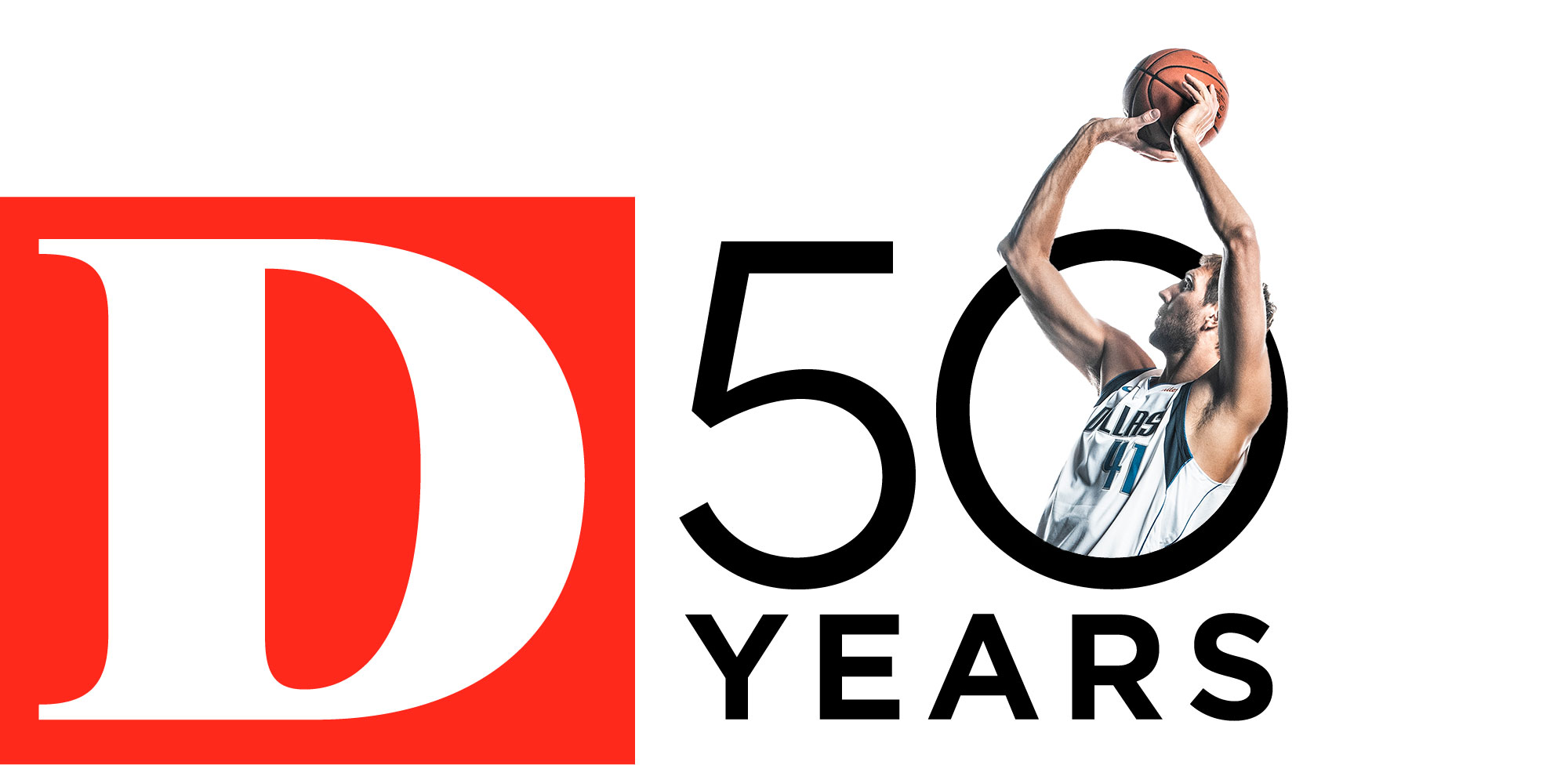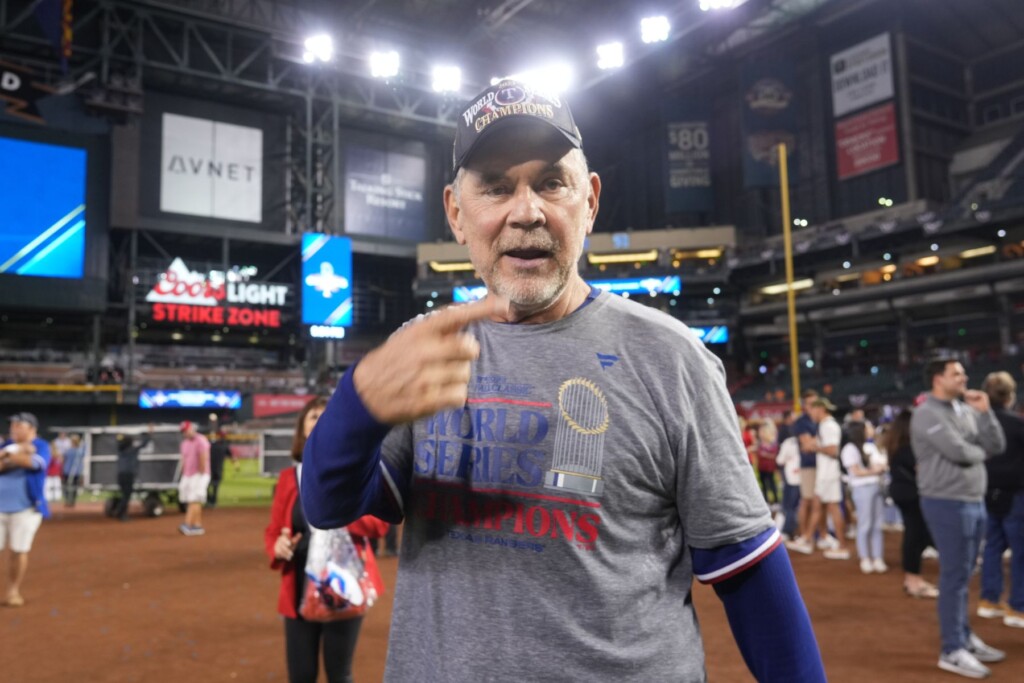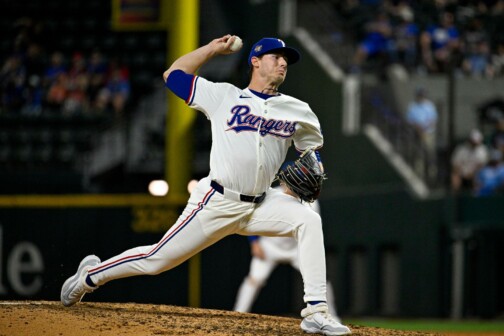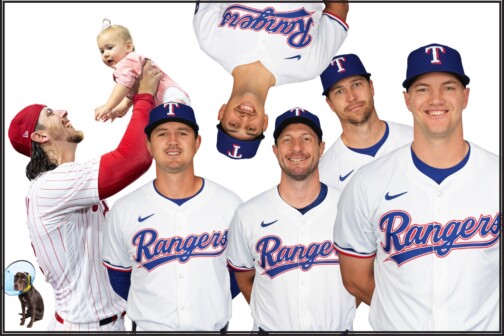Bruce Bochy and his team sealed the deal on the road, winning the World Series at long last—in the 53rd season since the team had picked up stakes and brought Major League Baseball to town.
“I couldn’t be prouder of a group,” the manager would say afterward. “They played with heart and determination. They weren’t going to be denied.”
That was done and was said in 2010, when Bochy’s San Francisco Giants took care of their Fall Classic business against the Rangers in Arlington. But surely you’d already caught that—the dead giveaway was that when he and his current team achieved a similar feat last November, it was in the Rangers’ 52nd year in Texas.
Though the Giants didn’t go into 2010 as anything close to the favorites, taking down the Rangers in five games served notice that San Francisco was going to be a problem for the National League for the foreseeable future. A veteran lineup and rotation—which included 26-year-old Tim Lincecum, who had already won two Cy Young Awards and beat Cliff Lee twice in that World Series—had been boosted significantly by a pair of in-season arrivals, rookie catcher Buster Posey and rookie starting pitcher Madison Bumgarner. Oddsmakers tabbed the Giants as one of the two teams most likely to win the National League pennant in 2011.
And then they missed the playoffs altogether. By a good bit, it turns out: San Francisco was eight games back in the division and two teams back in the race for the wild card (which was claimed by the Cardinals; you might recall how they ultimately fared that fall). Despite returning most of their roster, adding Posey’s and Bumgarner’s first full seasons in the majors, and retaining the steady Bochy at the helm, the Giants not only failed to repeat like every winner since 2000 had before them—they were eliminated before they finished playing games. Not where any team wants to be, particularly a defending champion.
It happens. A lot, in fact. Since the Yankees repeated as champs in 2000, there have been 23 title-defending seasons. No champion has even made it back to the World Series the following year, let alone won it. In fact, only seven of those 23 reigning champions managed to win their division the following year. Of the other 16, six claimed a wild card berth—but another six had losing records. That leaves four teams: that quartet finished between six and 19 games back in their respective divisions.
Is it my intention to shut down all hopes of a repeat from the 2023 World Series champions? C’mon. The Rangers dabbled mightily in the unexpected—and in some cases, unprecedented—last year, so why stop now?
But there are, of course, factors aside from historical trends to overcome. Three-fifths of the pitchers the Rangers are paying to be major rotation factors (Jacob deGrom, Max Scherzer, and Tyler Mahle) won’t pitch until close to midseason, if then, and the organization has done little to shore things up for the meantime. Even if the current starting five of Nathan Eovaldi, Jon Gray, Dane Dunning, Andrew Heaney, and Cody Bradford deliver quality results, how many innings do they pitch? Starting pitchers get hurt—both the 34-year-old Eovaldi and 32-year-old Gray missed significant time in 2023—and Eovaldi is the only one of the five who wasn’t deposited into a relief role for the postseason run.
In their pennant-winning season in 2011, the Rangers got an extraordinary 157 starts from C.J. Wilson, Colby Lewis, Derek Holland, Matt Harrison, and Alexi Ogando, with Scott Feldman and new director of pitching strategy Dave Bush logging the other five. Super rare.
But even then, Feldman had made 78 starts over the three previous seasons, and Bush, 85. The depth the Rangers have behind their penciled-in five consists of non-roster invitees Adrian Sampson, Danny Duffy, and Jose Urena plus minor leaguers coming off largely uninspiring years including Owen White, Jack Leiter, Cole Winn, and Zak Kent. Among those seven, only Urena got starts in the majors last year, and he was winless in his 10 opportunities.
You can see why reuniting with the still-unemployed Jordan Montgomery would feel so, so right.
But whether or not the big lefty returns to enjoy a lifetime supply of plus-plus barbeque, Bochy isn’t accustomed to this much starting pitching upheaval. His 2010 Giants team may not have returned to the postseason in 2011—but they won the World Series again in 2012. They then missed the playoffs in 2013—with a losing record—but won a third title in 2014. One of the main ingredients of that odd, enviable run of success was rotation stability. During that five-year run from 2010 to 2014, the Giants got an average of 31 starts from Lincecum plus 29 starts each from Bumgarner and Matt Cain. MadBum’s number elevates to 32 if you don’t count his 2010 rookie season, which started with half a year in Triple-A and ended with eight scoreless innings in Game 4 of the World Series. In that same span, Bochy also got 30-start seasons out of Barry Zito (twice), Ryan Vogelsong (twice), Jonathan Sanchez, and Tim Hudson. Spot starts from the Todd Wellemeyers, Yusmeiro Petits, and Eric Surkamps of the world were outliers.
The Rangers are not set up for that kind of rotation consistency. Part of that, to be sure, is the changing nature of the game. Openers didn’t exist in Bochy’s early San Francisco years. Neither did the philosophy on managing starter usage. In 2023, 380 pitchers made starts; in both 2010 and 2011, that number was only 272. Injuries aren’t fully to blame.
But in the Rangers’ case, it’s also a function of the makeup of the staff—and here, injuries are in fact a major factor; they know deGrom, Scherzer, and Mahle won’t be ready for months. Widen the lens, and we also see that Scherzer and Heaney are on contracts that will expire after this season. Eovaldi probably is as well: if he doesn’t reach 156 innings this year, he hits the market. (He pitched 144 innings in 2023.) If Eovaldi does rack up that many innings, a $20 million player option vests for him to take or leave. Gray and Mahle are under contract for the next two years.
Longer-term arrangements do exist. Dunning is under club control through 2026, and deGrom through 2028. The Rangers can keep White, Leiter, Winn, and Kent around much longer, along with Brock Porter, Jose Corniell, Kumar Rocker, Mitch Bratt, Josh Stephan, Aidan Curry, and others they have high hopes for. But there’s nobody in that sentence Texas can pencil in just yet as far as down-the-road planning goes.
Saint Lewis, whom I used to name after the team that traded Montgomery to Texas, famously signed nothing but one-year deals with the Rangers after the two-year pact they handed him to return stateside following a two-season stint in Japan. There are things about Montgomery that evoke Lewis. The demeanor. The build. The guile that makes a lack of overpowering stuff a footnote. The postseason gear.
But if Montgomery were to come back on a one-year pillow deal—at this point, with camps open, it has to be a consideration at least—it certainly wouldn’t be a precursor to four or five more of those. Finding a way to make a long-term alliance work would give Texas a much better chance of achieving that rotation stability that Bochy enjoyed in San Francisco.
Whether it would lead to another run of three championships in five years is a lot to ask. There is some merit to the vision for 2025 mapping out even better than 2024, whether projecting a healthy-from-the-start deGrom or imagining a fully ready Wyatt Langford—or a robust TV deal. The rotation, though, doesn’t really feel poised for a repeat this year or a pennant the year after. A Montgomery return improves the outlook significantly. Otherwise, Texas might have to find a way to do more with less from its arms. We’re only a few short months removed from the Rangers winning a World Series by doing just that. There are worse traits than resourcefulness to try and build a dynasty from, even if the next ring doesn’t come right after the first one.
Author







